Key takeaways:
- Ethical frameworks guide decision-making and help navigate moral dilemmas, shaping beliefs and actions.
- Pro-life advocacy emphasizes the sanctity and inherent dignity of life, fostering compassion and community support.
- Building personal beliefs around pro-life requires introspection, personal storytelling, and community engagement.
- Effective advocacy involves active listening, creating partnerships, and developing a flexible personal action plan for outreach.
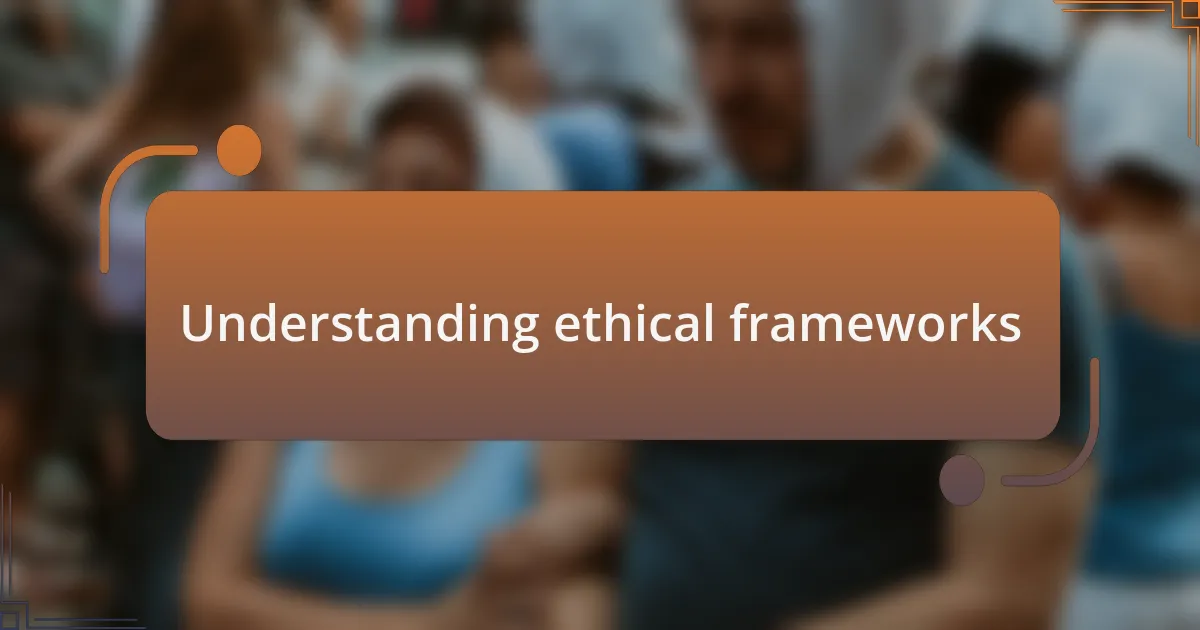
Understanding ethical frameworks
Ethical frameworks serve as a foundation for decision-making, guiding us through complex moral dilemmas. I remember grappling with tough choices during community advocacy events, where understanding different ethical principles helped clarify my stance. How do we determine what is right when faced with competing values?
At their core, these frameworks help us navigate the gray areas in life. For instance, when I faced a debate on pro-life issues, I found myself drawn to utilitarian perspectives, considering the greater good. It’s fascinating to reflect on how these frameworks shape our beliefs and actions, isn’t it?
Different ethical theories—like deontology or virtue ethics—each offer unique lenses through which we can assess our convictions. I’ve often pondered whether sticking strictly to rules is the most effective approach or if fostering compassion and understanding could lead to more impactful outcomes. These reflections underline the importance of regularly revisiting and refining our ethical viewpoints.
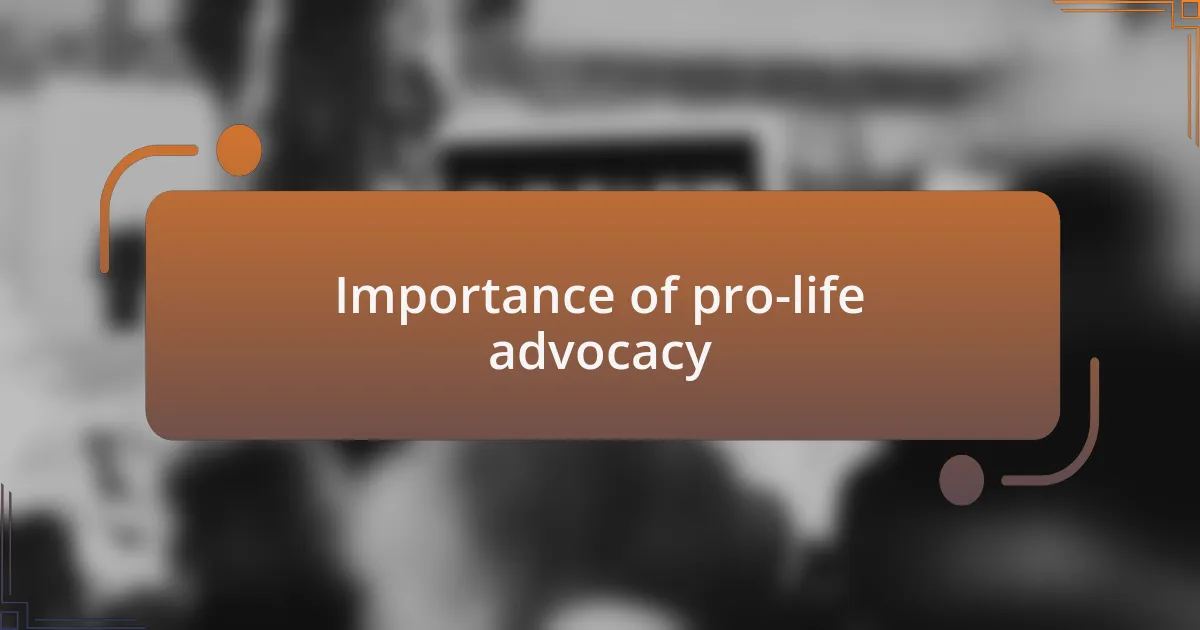
Importance of pro-life advocacy
Advocating for pro-life issues is crucial because it emphasizes the value of human life at all stages. I vividly recall a conversation with a friend who shared her story of an unplanned pregnancy. It struck me how powerful our narratives can be in shaping public perception; her voice mattered in a world that often overlooks the complexities of life and choice. Isn’t it intriguing how personal stories can challenge societal norms?
Moreover, pro-life advocacy can foster a more compassionate society by encouraging dialogue about difficult subjects. While volunteering at a local crisis center, I witnessed how support systems can empower individuals to choose life. These experiences not only reinforced my belief in the pro-life mission but also highlighted the importance of creating safe spaces for conversation. How often do we truly listen to one another’s experiences?
Lastly, pro-life advocacy serves as a call to action for defending the most vulnerable among us. As I reflected on my own participation in marches and rallies, I recognized the communal strength in advocating for life. Each step I took felt like a step toward a deeper understanding of our shared responsibility in supporting families and nurturing those in need. Isn’t it inspiring to think about the impact we can collectively make through our advocacy?
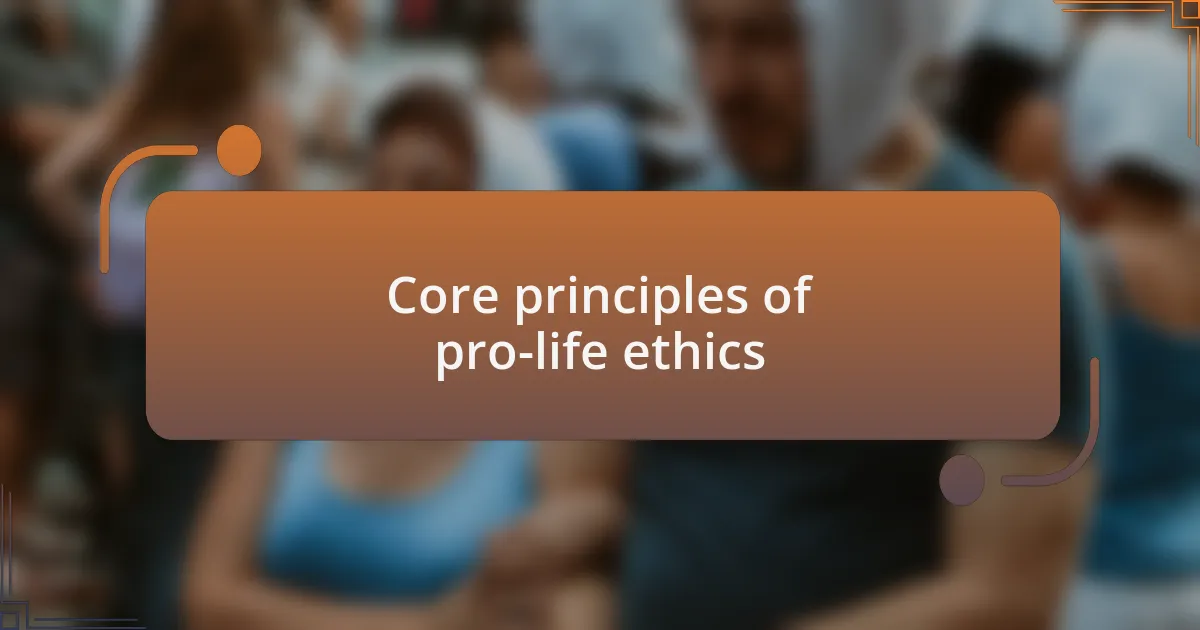
Core principles of pro-life ethics
The core principle of pro-life ethics centers on the inherent dignity of every human being, which compels us to recognize life as sacred from its very beginning. I once attended a workshop where various perspectives on life were discussed, and the compelling arguments about the value of each individual really resonated with me. It made me wonder, how often do we pause to consider the unique potential within every person, even before birth?
Another cornerstone is the belief in the sanctity of life, which transcends personal circumstances, societal pressures, or perceived quality of life. During my time volunteering with expectant mothers, I found myself deeply moved by their stories of resilience and hope. It made me think about how society often focuses on challenges rather than the possibilities for growth and love that come with bringing new life into the world. Wouldn’t it be transformative to shift our focus towards the potential each life holds?
Moreover, pro-life ethics emphasizes personal responsibility, encouraging individuals to make choices that respect and preserve life. I remember reflecting on personal choices I’ve had to make; they weren’t always easy, and they challenged my beliefs. It made me realize how essential it is to support one another in making life-affirming decisions. How can we foster a community that upholds these values while offering compassionate support to those facing tough choices?
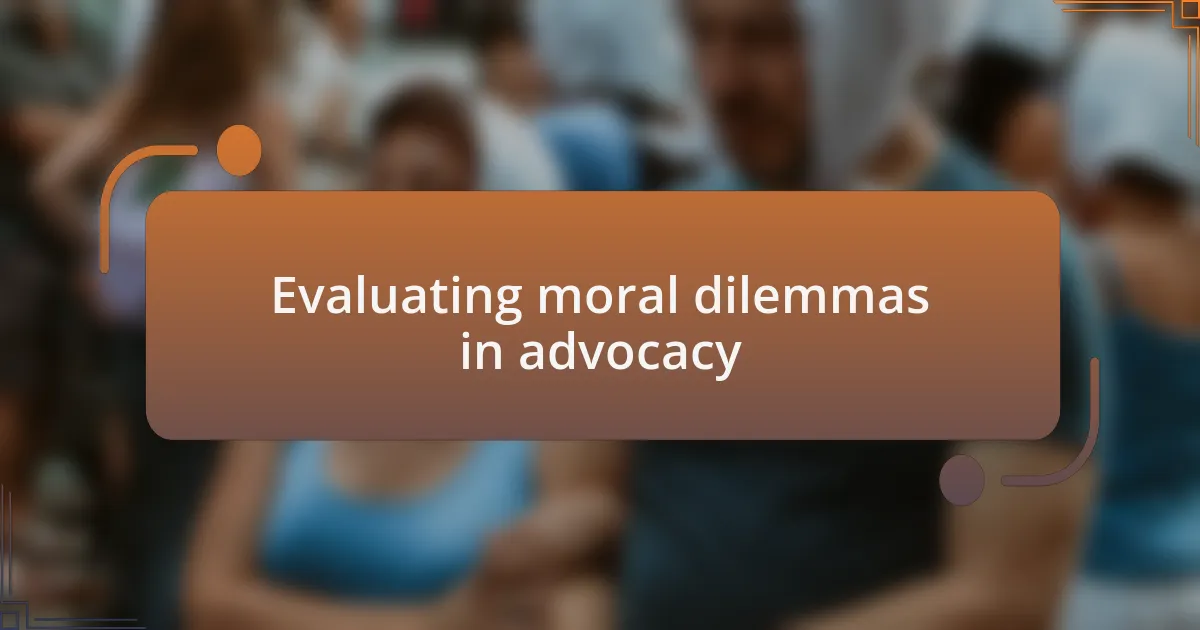
Evaluating moral dilemmas in advocacy
When evaluating moral dilemmas in advocacy, I often find myself grappling with the tension between compassion and conviction. For instance, I recall a conversation with a friend who was in a crisis pregnancy; her fears about the future led her to consider drastic choices. It made me ask: how do we balance supporting individuals in distress while upholding the inherent value of life? This question is central in pro-life advocacy and often requires deep personal reflection.
Navigating these dilemmas can be a complex experience, especially when faced with societal narratives that prioritize autonomy over life. I remember attending a seminar where passionate advocates shared stories of individuals who felt pressured to make difficult choices. Hearing their testimonials affirmed my belief that recognizing each person’s unique circumstances while promoting a pro-life message is crucial. I started thinking, how can we bring a narrative of hope and possibility that truly resonates without diminishing the struggles people face?
Moreover, I believe moral dilemmas push us to examine our own convictions deeply. I once experienced a moment of uncertainty when a close family member expressed support for abortion in specific cases. It challenged me to articulate my beliefs more clearly and to delve into what it truly means to advocate for life. In these moments, I’ve learned that advocacy involves not only expressing our views but also fostering dialogue that invites others to explore the moral complexities of life together. Isn’t it essential for us to connect on a human level, especially in these challenging conversations?
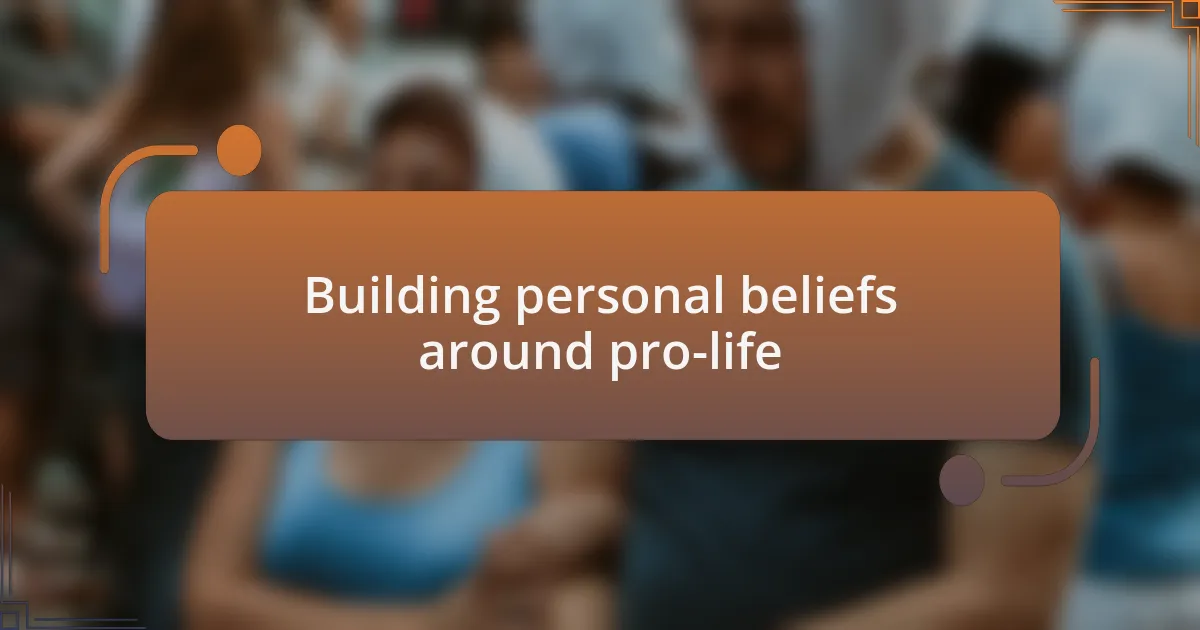
Building personal beliefs around pro-life
Building personal beliefs around pro-life advocacy requires introspection and a willingness to confront uncomfortable truths. I remember reflecting late one evening after discussing pro-life ideals with my children. Their innocent questions about why life matters made me realize the importance of simplifying these complex ideas into values they could grasp. It often strikes me that our beliefs need to be rooted in compassion; how do we ensure these values are conveyed not just as doctrine but as heartfelt truths?
During my journey, I found that incorporating personal experiences into my beliefs was instrumental. One instance was when a close friend shared her joy after giving birth despite facing immense challenges. Watching her embrace motherhood strengthened my understanding of the beauty and resilience of life. It made me ponder: how can we share stories of triumph over adversity to inspire others, rather than merely presenting statistics or ideological arguments?
Additionally, nurturing pro-life beliefs means immersing oneself in the wider community. I took a leap and volunteered at a local pregnancy resource center, which opened my eyes to the diverse realities faced by expectant mothers. Engaging with these women allowed me to witness their struggles firsthand and reinforces the idea that pro-life advocacy isn’t just a viewpoint—it’s a commitment to support others in their paths. Isn’t it essential that our beliefs not only reflect our values but also serve as a bridge to connect and uplift those around us?
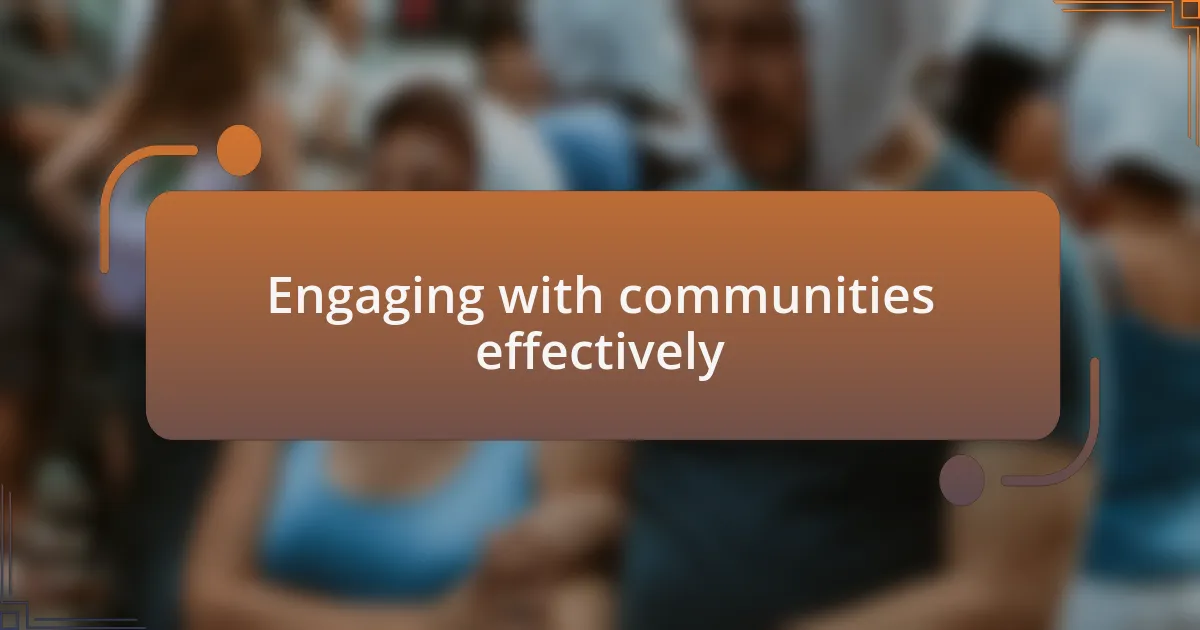
Engaging with communities effectively
Engaging with communities effectively is about building genuine relationships grounded in trust. I remember attending a local health fair where I set up a booth dedicated to promoting pro-life resources. It was fascinating to see how many people approached me, sharing their experiences related to unexpected pregnancies or personal struggles. This face-to-face interaction allowed for meaningful conversations that helped to humanize the pro-life message, transforming abstract beliefs into relatable stories.
Listening actively is another crucial aspect of effective community engagement. I’ve found that when I genuinely listen to others, it creates an avenue for dialogue that is often more impactful than any prepared speech. One day, I encountered a young mother who felt overwhelmed and unsure about her decision to continue her pregnancy. By simply offering her a listening ear, I discovered layers of her story that made it clear how essential it is to tailor support to individual needs. Isn’t it interesting how a few moments of compassion can lead to a deeper understanding of one another’s journeys?
Moreover, fostering community partnerships can amplify your reach and effectiveness. During a collaborative event with various local organizations, I saw firsthand the power of unity. Different voices came together, advocating for shared values, and it was inspiring to witness. Watching community members engage with each other highlighted how pooled resources and diverse perspectives can lead to stronger support networks. This experience reinforced for me that in our advocacy, it’s not just about our individual beliefs; it’s about creating a collective impact.
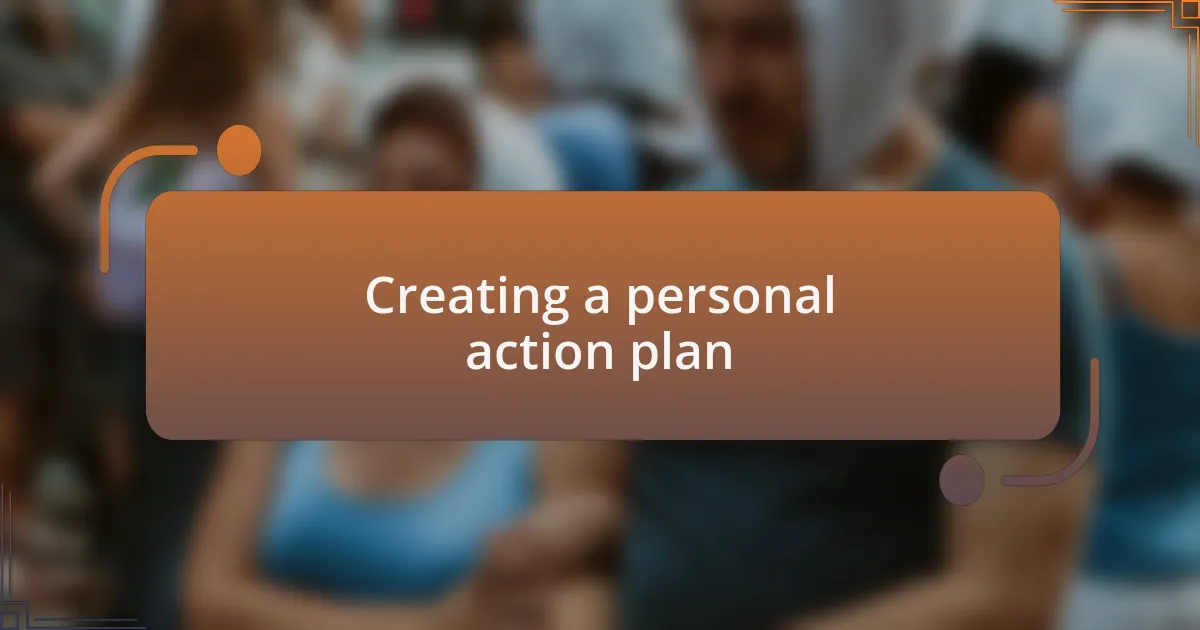
Creating a personal action plan
Creating a personal action plan starts with self-reflection about your core values and beliefs. I recall the moment I wrote down my motivations for advocacy. It was more than just a list; it became a roadmap for my actions. Reflecting deeply on why I stand for pro-life principles illuminated the specific areas I wanted to focus on—whether it was education, outreach, or community support.
Next, setting actionable goals can make your aspirations more tangible. I once did this exercise where I broke down my larger goal of increasing awareness in my community into smaller, manageable steps. This approach led me to organize monthly seminars with guest speakers who shared personal stories about the importance of the pro-life movement. Have you ever noticed how small victories can lead to greater momentum? Each seminar became not just an event but a celebration of shared values and community engagement.
Lastly, it’s essential to regularly evaluate your progress. I make it a habit to revisit my action plan every few months and adjust it based on what’s working and what isn’t. One time, after assessing my outreach efforts, I discovered that social media wasn’t bringing the engagement I expected. This realization prompted me to shift my focus towards more in-person interactions, leading to more meaningful connections. How often do we overlook the need for flexibility in our plans? Adjusting your strategies can often open unforeseen doors.